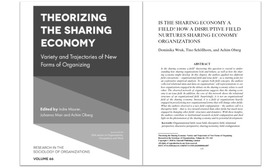News
|
You are doing research on the sharing economy and want to share your insights and get feedback? Then submit an abstract to the 7th International Workshop on the Sharing Economy (IWSE) before September 30, 2020. The workshop will take place in Barcelona, Spain, and will be hosted by the Faculty of Economics and Business Studies of the Open University of Catalonia (UOC). | ||
i-share, platforms2shareNeue Termine gefunden: Das sechste i-share Symposium und zweite platforms2share Forschungskolloquium finden am 12./13. Oktober 2020 stattAufgrund der aktuellen Entwicklungen um Covid-19 werden wir das i-share Symposium und das platforms2share Forschungskolloquium auf den Herbst verschieben. Erfreulicherweise haben wir bereits Ersatztermine gefunden. Die Veranstaltungen finden am Montag/Dienstag, den 12./13. Oktober 2020 an der Universität Mannheim statt. | ||
i-share, platforms2shareHow is the sharing economy field structured? Dominika Wruk, Tino Schöllhorn and Achim Oberg address this question in their current publicationIn their exploratory study, the platforms2share researchers find that sharing organizations receive attention, resources and legitimation from a „disruptive field“ of organizations including tech-media and venture capitalists – a field that initiates and support technological innovation which potentially disrupt existing fields and industries. So far, the field pays attention to dominant models in the sharing economy such as Airbnb or Uber. The authors published the chapter in the renowned series „Research in the Sociology of Organizations“. | ||
|
Beim Hackathon der Bundesregierung entstand eine Vielzahl an Projekten, die sich an Prinzipien und Organisationsformen der Plattform- und Sharing Economy orientieren und diese auf die Herausforderungen der aktuellen Krise übertragen. Einige der ausgezeichneten Siegerprojekte möchten wir hier vorstellen. | ||
i-share, platforms2shareWie ist das Feld der Sharing Economy strukturiert? Dieser Frage gehen Dominika Wruk, Tino Schöllhorn und Achim Oberg in ihrer aktuellen Veröffentlichung nachIn Ihrer explorativen Studie zum Feld der Sharing Economy finden die ForscherInnen heraus, dass Sharing Organisationen Legitimation und Ressourcen von einem „Disruptiven Feld“ an Organisationen (z.B. Tech-Medien, Venture Capitalists) erhalten, die technologische Innovationen anstoßen und stärken und damit bestehende Industrien und Felder disruptieren. Bisher schenkt dieses Feld insbesondere dominanten Sharing Organisationen (z.B. Airbnb, Uber) Aufmerksamkeit. Die Autoren veröffentlichen das Kapitel in der renommierten Serie „Research in the Sociology of Organizations“. | ||
i-share, platforms2shareHow is the sharing economy field structured? Dominika Wruk, Tino Schöllhorn and Achim Oberg address this question in their current publicationIn their exploratory study, the researchers find that sharing organizations receive attention, resources and legitimation from a „disruptive field“ of organizations including tech-media and venture capitalists – a field that initiates and support technological innovation which potentially disrupt existing fields and industries. So far, the field pays attention to dominant models in the sharing economy such as Airbnb or Uber. The authors published the chapter in the renowned series „Research in the Sociology of Organizations“. | ||
|
48 Stunden. Herausforderungen der Bundesregierung und aus der Gesellschaft. Du und theoretisch 80 Millionen andere. Die Covid-19 Krise. Vielfältige Lösungen. Sei mit Deinen Fähigkeiten dabei, wenn wir Lösungen aus der Gesellschaft für die Gesellschaft entwickeln. | ||
|
Julia Kristin Göhringer und Johanna Mair analysieren in einem Blog-Artikel die sozialen Aspekte von Sharing Economy Organisationen im Nonprofit-Bereich. | ||
|
Good communication and recognition are key ways for sharing economy organisations to retain volunteers, write Julia Kristin Göhringer and Johanna Mair | ||
|
Wir freuen uns über Einreichungen von wissenschaftlichen Vorträgen und Erfahrungsberichten aus der Praxis für das Symposium, sodass diese Beiträge einem breiteren Publikum aus Wissenschaft, Praxis und Politik vorgestellt werden können. Für das primär forschungsorientierte Kolloquium am Folgetag sind Ideen und Beiträge zu laufenden Forschungs- und Qualifizierungsarbeiten zur Platform Economy sehr willkommen. | ||












